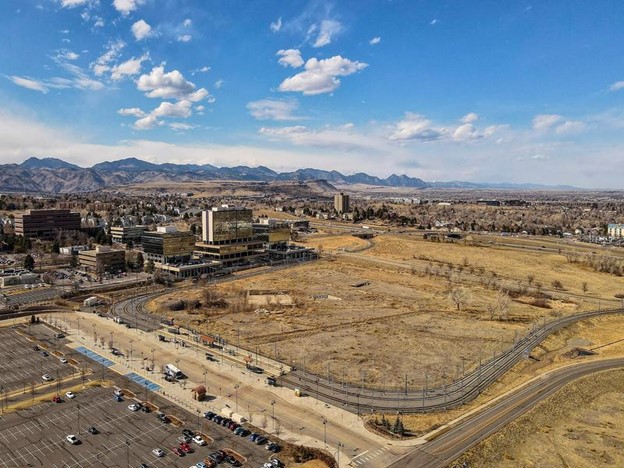After nearly a decade of on-again, off-again negotiations, a 59-acre piece of vacant land at 6th and Union Blvd in Lakewood, owned by the U.S. General Services Association (GSA), sold this month for $30 million to Lincoln Property Company.
The site, which is adjacent to the Denver Federal Center, is the last large infill land for big development in the Denver MSA and is entitled for 1,700 multifamily units, retail, hospitality, and senior living. It will ultimately be a multi-billion dollar project but the first phase calls for horizontal land development with the potential for Tax Incremental Financing (TIF) and Public Improvement Fee (PIF).
Jeb Boshart, the founder of Lakewood-based Forge Partners — a full-service development, construction management, and real estate brokerage company — was originally set to purchase the property but sold it to Lincoln Property Company. Creighton Bildstein, principal with PlattPointe Capital, a local capital markets advisory firm, helped Boshart arrange what turned out to be complex financing for the deal.
On September 1, 2022, Boshart received an email from the GSA stating that he was eligible to make an offer for the 59-acre piece of raw ground adjacent to the Denver Federal Center (8,000 employees) and St. Anthony’s Hospital (800 employees & 1,400 caregivers) at 6th and Union Blvd in Lakewood, near a light rail station and an RTD parking structure. He bid $30 million on September 15 and four hours later the GSA contacted him to inform him that he was the winning bidder. Boshart and his partner were required to put up a 10% ($3M) hard deposit immediately and had just 45 days of due diligence to acquire it (or not).
According to Bildstein, Boshart and his partner, Jerry Thompson, put up a total of over $6 million in hard deposit dollars and approximately $500k in soft costs to get due diligence extensions. The big carrot to owning this property was the potential to make between $42 and $26 million in profit conservatively by strictly doing a land play over a 36-month period (depending on the TIF and PIF dollars).
The equity partner was light on liquid capital so Bildstein had to find equity options of $12 million to finalize the acquisition. He put together a package on the opportunity and presented it to over 30 private equity groups and real estate developers. They all loved it but couldn’t get comfortable with the environmental, traffic, and potential subsidies in 45 days, nor come up with $12 million in that time frame.
The biggest complexities with the deal:
- 15 of the 60 acres had a munitions manufacturing facility on it during WW2, so potential environmental problems
- No traffic study had been conducted in over 10 years — traffic has increased 5x since the last study which recommended a $30 million bridge be built over the 6th Avenue freeway to provide access to the property.
According to Bildstein, Boshart ended up getting a number of extensions from the GSA but in odd increments of 45 days, 15 days, 15 days, 30 days, etc. It made it impossible for Boshart to commit.
“Had we known from the very beginning that we’d have a total of 204 days for due diligence, we would have easily closed it with at least ten of the groups we presented the package to,” said Bildstein. “The GSA made the deal very difficult. With about 45 days before the final and last date to close with the GSA, Lincoln Property Company contacted my client directly and made a deal to buy the property with cash. So, Jeb and his partner were able to stay in the deal with a $5 million stake, under completely different terms than they’d originally intended.”
It is too early to know what Lincoln Property Company’s development plans entail, though the City of Lakewood is eager to see what will become of the site.
According to the Denver Post, the property’s sale history is complex. Federal officials put the property up for auction in 2017 but a Federal judge put a stop to that when the Colorado Coalition for the Homeless sued due to a law that prioritizes homeless agencies to bid on excess U.S. government real estate.









